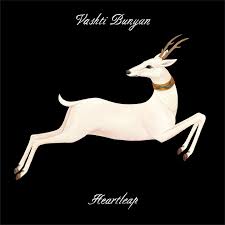Vashti Bunyan’s voice, equal parts fragile and beautiful, might well function as a metaphor for her two-part career. First, the fragile: after being discovered at a young age by The Rolling Stones’ manager, Andrew Loog Oldham, Bunyan embarked on a failed attempt at pop stardom. She later broke her contract with Oldham, travelled the length of Britain in a horse-drawn cart in a quixotic attempt to find an artist’s colony set up by Donovan, and wrote an album’s worth of material on the way. The result and her debut, Just Another Diamond Day (1970), was a commercial flop. A dispirited Bunyan consequently quit the music industry. Then, the beautiful: thirty or so years later, after searching for her own name on the internet as a lark, she discovered that Diamond Day had found an appreciative audience in the then-burgeoning ‘freak folk’ scene and that original copies were changing hands for absurd sums on eBay. The album was given an official re-release, and she used the royalties to buy a basic home studio setup that would record her second album, 2005’s critically acclaimed Lookaftering. Now, she has released what will apparently be her third and last album, Heartleap.
Despite this unorthodox career, and that ethereal voice, Bunyan is herself something a steely pragmatist. She left Oldham’s orbit after experiencing too much heartbreak from heightened expectations of "making it"; her decision to quit music making for good after the failure of Diamond Day seems to have been similarly motivated by self-preservation. Her albums have been read as paeans to a certain form of pastoralism, but she has admitted that she didn’t care much for the hardships of the hippie dream. She does not see herself as a folk singer, and made both Lookaftering and Heartleap with that most rustic and artisanal of musical instruments, a Mac. (She taught herself music production after her local technical college refused to allow her to enrol in a music production course as she was "too old".) True to this form, then, her decision to call it quits on this album-making caper has less to do with her being a free-spirited flake chasing her bliss, than a practical recognition that by the time it would take for her to release another album, the form may well be extinct. (She plans release her music as digital singles from now on.)
There’s a paradox in the heart of Bunyan’s music: that seeming fragility belies years of tough experiences and hard-won wisdom. (Consider Lookaftering‘s ‘Wayward’, which distills Simone de Beauvoir’s observations about the immanent nature of housework and the way gendered divisions of labour condemn women to incomplete lives into two powerful lines: "Days going by in clouds of flour and white washing / life getting lost in a world without end.") On Heartleap‘s opener, ‘Across The Water’, Bunyan reflects not only on the skills that have allowed her to survive her life thus fa – "Lived on wit, got away with it" – but also on the inevitability of her own death: "Every day is every day / can’t tell one from the other / Wait to fall at the end of it all / as stones skip across the water." The song might sound as insubstantial as gauze – consisting of Bunyan’s voice, some delicately plucked acoustic guitar, a handful of notes rendered on a celesta-like synthesiser, and some simple string and woodwind accompaniments – but its message of the necessity of ultimately coming to terms with the inevitability of death is anything but insubstantial.
Similarly, the beautiful ‘Mother’ – which features a gorgeous piano figure apparently painstakingly arranged note by note on Bunyan’s computer – speaks of a young Bunyan accidentally eavesdropping on her own mother’s stymied musical ambitions: "I was her only audience / She believed herself alone / My applause should have been rapturous / but I closed the door and turned, turned, turned away." It’s hard not to hear in this song regret not only for the incident Bunyan describes, but also for the way Bunyan deprived her own children of a musical upbringing after the supposed failure of Diamond Day. ‘Gunpowder’, too, is filled with bitterness – this time about a partner of Bunyan’s, who lays "gunpowder trails" of rage that prevent her from freely speaking lest she incur his wrath. When she finally gains perspective on this abuse, she is filled with regret for having wasted her time: "I blow my chances / and you throw the years out / with all the merry dances / you led me, you led me."
Heartleap is the least-adorned of Bunyan’s albums; in its quiet austerity it makes even the beautiful simplicity of Diamond Day seem stuffed with sound, absurdly rococo. It’s also, perhaps not coincidentally, the album on which Bunyan herself does nearly all the work – unlike Lookaftering, which relies on the talents of session musicians, producer Max Richter, and Devendra Banhart and Joanna Newsom. (Banhart does appear on Heartleap, but only as a backing singer, fully under Bunyan’s control). There’s something very satisfying about listening to a woman whose career has been marked by deeply ambivalent encounters with the machinery of the music industry – who was briefly being touted as the next Marianne Faithful under Loog Oldham, and whose work was later forced into a folk mould on Diamond Day – finally seize the means of music production and create an album on her own terms. In that sense, Heartleap might be the purest expression of Bunyan’s talents and painfully earned worldview. But Heartleap would still be worth listening to even if a rotating roster of producers and musicians had helped realise each separate track. Listening to it feels like holding a newborn baby: it’s warm, so fragile that you’re afraid that your quotidian carelessness might harm it, thrumming under the skin with a quiet vitality, unspeakably beautiful, and impossibly valuable.
<div class="fb-comments" data-href="http://thequietus.com/articles/16515-vashti-bunyan-heartleap-review” data-width="550">


